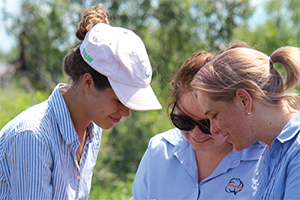The PBRI has initiated a new collaboration for extension experts across plant industries and government to work together to increase coordination and information sharing on biosecurity issues.
The Biosecurity Extension Community (BEC) met for the first time last week to discuss common biosecurity extension issues across plant industries, that would benefit from a coordinated approach to improve industry biosecurity outcomes.
The aim of the community is to:
- Connect extension experts from across plant industry bodies and government agencies on topics relevant to plant biosecurity and extension best practice.
- Achieve better coordination and collaboration of biosecurity extension efforts including to develop shared resources and products for areas identified as a high priority.
- Act as a forum for receiving cross-sectoral biosecurity research updates and to contribute ideas for new extension priorities.
Jo Luck (PBRI), Sharna Holman (Cotton Info), Callum Fletcher (Aus Veg) and Craig Elliott (Wine Australia/Hort Innovation) convened the online meeting on 25 March, after identifying a number of common issues relating to biosecurity extension.
A broad range of extension staff attended including technical managers, biosecurity coordinators, industry development officers and managers and national biosecurity managers from state organisations, peak industry bodies, RDCs, industry extension, research program managers and regional extension groups. The Australian plant industries represented included: cotton, wine grapes, grains, vegetables, berries, seed potatoes, nursery industry, apples, citrus, and AgriFutures Australia, representing rice, ginger, fodder crops and emerging industries.
A survey was sent to the extension community prior to the meeting, which confirmed a high level of interest in the meeting and that most plant industries faced common challenges in delivering extension activities and promoting biosecurity.
Some of the survey responses included:
- “I think that there is currently a gap in the opportunities available to connect and collaborate within the sphere of biosecurity extension and engagement at an industry level. I hope that this initiative will help to alleviate this and help to integrate this with existing surveillance, diagnostics and government focused networks.”
- “We often work in silos but so many of our challenges are faced by other industries as well. The exchange of ideas will help resolve our problems more creatively and probably faster through another person’s experience. Collaborating may even help us become more cost-efficient.”
- “One of the recognised issues within my region is biosecurity. However, I am fully aware that it is not merely a regional issue, but a national one. Being able to collaborate with other regions and industry stakeholders could only strengthen knowledge and awareness.”
Common themes from across industry emphasised the need to collaborate more, benefiting from the learnings of the members to avoid future duplication or ‘working in silos’.
Further meetings are being planned with topics likely to include:
- Case studies on past incursions to discuss lessons learnt for extension and engagement and preparedness planning.
- Good biosecurity practice implementation – what works, what does not work?
- Professional development and guest speakers on biosecurity and extension topics.
- Biosecurity R&D updates and discussion of future cross-sectoral extension activities.
For more information contact Dr Jo Luck jo.luck@horticulture.com.au
